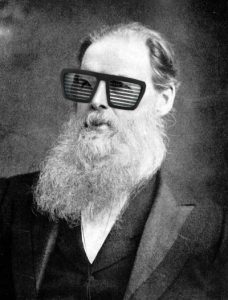The Legacy of Edward Tylor – Roundtable
Edward Burnett Tylor (1832-1917) in many respects has a fixed place in the academic memory of religious studies and cultural anthropology yet acknowledgement of his role is often purely historical, as a key ancestor of little direct relevance to contemporary discussions. This has left us with a limited narrative about the man and his work; a particular received or canonical Tylor defined by his introduction of the concept of animism, his intellectualist approach to religion, his armchair research and staunch social evolutionism. The year of his centenary is an opportunity to begin the task of critically examining the legacy left by Tylor’s work on religion and culture, how much the received Tylor matches his body of work, whether other Tylors can be extracted from these texts which undermine such a limited perspective on a long and eventful career and whether contemporary scholars can find anything of ongoing relevance in the work of such a historically distant figure.
This roundtable recorded at the annual BASR conference at the University of Chester 2017 brought together a group of scholars interested in different perspectives on the legacy of Tylor. Topics discussed included his impact on indigenous societies, the debates over animism, monotheism and the definition of religion as well as his relevance to the cognitive sciences of religion and the degree to which Tylor can be classed as an ethnographer and more. This roundtable includes contributions from Dr Miguel Astor-Aguilera of Arizona State University, Dr Jonathan Jong of Coventry University's Brain, Belief, and Behaviour Lab, James L. Cox Professor Emeritus at the University of Edinburgh, Liam T. Sutherland - PhD Candidate at the University of Edinburgh, Professor Graham Harvey and Dr Paul Tremlett at the Open University and the much appreciated audience!
The centenary of Tylor's death was also the theme for a new volume edited by Tremlett, Sutherland and Harvey 'Edward Tylor, Religion and Culture' published with Bloomsbury which features contributions from all of the roundtable participants (apart from the audience) and several other scholars, which was launched at the conference.
*This week’s podcast is sponsored in part by, Cen SAMM. Through their collaboration with INFORM, they’ve created a searchable database of millenarian movements available online.*
African American Spiritual Churches
Dr. Guillory teaches religion at the University of Rochester, but her first love is natural science. After receiving a B.A. in Chemistry, she taught high school science for several years. She draws inspiration from the sciences in her current research as a religion scholar. In her investigations of African American Spiritual Churches in New Orleans, Louisiana, Dr. Guillory describes a "dynamical self," a fluid state of identity shifting between the individual and the collective. Her knowledge of chemistry directly influenced this theory.
The African American Spiritual Churches are combinatory religious sites, which blend Protestant, Catholic, Spiritualist, Haitian Voodoo, and Benin's traditional Vodun practices. Female leadership and business management has been essential in the history of these churches. Dr. Guillory's upcoming book draws on years of archival research, ethnographic observation, and oral history interviews to tell the story of these churches from 1920 to the present day. Hurricane Katrina looms large in this story. Most of the physical churches were destroyed in the flooding — or the former inhabitants were not allowed to return as the government began eminent domain proceedings. Yet this religious community endures. Guillory is one of the first scholars to work with the Spiritual Churches, whose affairs remain largely private. Our interview concludes with a discussion of anthropological ethics and practice — how to earn the trust of a community, and how to tell someone else's story without "stealing" that story.
Autism, Religion, and Imagination
Due to their atypical thinking styles, individuals on the autism spectrum represent a unique population of study in the cognitive and psychological sciences of religion. Because religious cognition stems from normal social-cognitive capacities, which are altered for individuals on the spectrum, researchers also expect variation in how they think about supernatural agents. In her interview with Thomas J. Coleman III for the Religious Studies Project, PhD student Ingela Visuri, from Sodertorn and Gavle Universities in Sweden, discusses the findings of her research with adolescents on the spectrum, which challenges and informs past theorization in the scientific study of religion and nonreligion.
God and Mathematics
What does math have to do with religion? In his interview with Hans van Eyghen, author Chris Ransford discusses his latest book 'God and the Mathematics of Infinity'. He discusses why mathematics is useful for thinking about religion, covering some of the conclusions he draws in the book.
Against Invention: A richer history for ‘Hinduism’
In this interview Associate Professor Will Sweetman talks to Thomas White about the idea that ‘Hinduism’ and many of the other terms we use to classify religions—including the term religion itself—are modern inventions, emerging out of nineteenth-century inter-cultural contact and European colonialism. Will argues against this critique, and to make his case he draws on historical sources that discuss ‘Hinduism’ both outside of the anglophone experience and long before the nineteenth century. Through identifying alternative, non-anglophone sources of cross-cultural, West-East encounters, where comparative religion is the subject of reflection and description, the concept of ‘Hinduism’ is presented as obtaining a much richer history than the ‘invention thesis’ allows. Such sources include accounts by German Protestant missionaries and those by Jesuits writing in Portuguese, as well as native, expository works by self-reporting Indian religious thinkers. Will argues that ‘Hinduism’ as a concept is older, broader, and indeed more internal to India, than is currently assumed, but this is frequently missed through an overemphasis on relatively late sources almost exclusively in English. The interview goes on to discuss the implications of this research - and endeavours similar to it - for the study of religion in general. The interview closes with a brief chat about Otago’s hosting of the IAHR Congress in 2020.
*This week’s podcast is sponsored in part by, Cen SAMM. Through their collaboration with INFORM, they’ve created a searchable database of millenarian movements available online.*
From Non-Religion to Unbelief? A developing field…
The twenty-first century has witnessed growing academic and popular interest in a variety of categories which are related to 'religion' but conceptualized as 'other'... atheism, non-religion, secularity, religious indifference, and so on. Each of these categories can be conceptualized as aspects of the general category ‘unbelief’—‘used in a wide sense, implying a generalized lack of belief in a God or gods’ (Lee and Bullivant 2016).
Back in 2012, Chris sat down - with friend and colleague Ethan Quillen - to speak to Lois Lee, on the topic of 'non-religion'. Since then, a lot has changed. Lee has climbed the academic ladder, publishing her first monograph with OUP in 2015 - Recognizing the Non-Religious: Re-Imagining the Secular - and currently serving as project leader on the Understanding Unbelief programme. This is a major new research programme aiming to advance scientific understanding of atheism and other forms of ‘unbelief’ around the world through core research and an additional £1.25 million being spent on additional projects and public engagement activities. Chris's career has also progressed, with recent work including co-editing New Atheism: Critical Perspectives and Contemporary Debates, and beginning a postdoctoral project engaging in a comparative study of 'unbelief' in Scotland and Northern Ireland.
In this podcast, we check in with the state of the field, discuss developments beyond the Anglophone "West", some of the many exciting projects being worked on under the "Understanding Unbelief" banner, the utility and pitfalls of the terminology of "unbelief", and some of the critical issues surrounding the reification of survey categories.
Of relevance to the themes discussed, include Marta Trzebiatowska's blog post on gender issues in non-religion studies: Not for Girls? Gender and Researching Nonreligion. This blog is part of the NSRN/SSNB blog series on research methods. The full series is introduced here: Research Methods for the Scientific Study of Nonreligion, by Lois Lee, Stephen Bullivant, Miguel Farias and Jonathan Lanman, Nonreligion & Secularity Research Network, 2016.
Specific Understanding Unbelief projects mentioned in the podcast include:
* Mapping the Psychology of Unbelief Across Contexts and Cultures, PI: Jonathan Jong, Psychology, Coventry University, UK
* Nonreligious Childhood: Growing Up Unbelieving in Contemporary Britain, PI: Dr Anna Strhan, Religious Studies, University of Kent, UK,
Listeners may also be interested in our podcasts on "Understanding the Secular", "Permutations of Secularism", "Non-Religion", "Secular Humanism". "The Post-Secular", "Studying Non-Religion within Religious Studies", "The Secularization Thesis" and more...
‘Good’ Grief? Rituals of World Repairing
Toys, Rabbits, and Princess Diana - three things that may not seem at all connected. However, when one starts to question the notion of grief, bereavement, and death in the contemporary West, these three are more connected than appears. In this podcast, Breann Fallon interviews Professor Douglas Ezzy of the University of Tasmania on the power of symbols in creating relationships and world-repairing rituals in the context of grief and death. Ezzy discusses the misjudgments of Durkheim in his assessment of Australian Aboriginal symbols as well as the children's book The Velveteen Rabbit (1922), the death of Princess Diana, and his own interaction with symbols in this original take on grief and death. Here, the notions of 'good' grief, the use of ritual in creating 'good' grief, and the very notion of 'religion' bring to light the active role are able to play in dealing with death.
The BASR and the Impact of Religious Studies

A panel on the public impact and engagement of Religious Studies/Study of Religion/s led by committee members of the British Association for the Study of Religions, including Dr Stephen Gregg (Wolverhampton), Dr Christopher Cotter (Edinburgh), Dr Suzanne Owen (Leeds Trinity), Dr David Robertson (The Open University) and Dr Steven Sutcliffe (Edinburgh).
Issues discussed include why RS continues to be a "muted voice" in public discourse; minority religion and the law; podcasting; and new audiences for RS.
This was presented as part of the University of Edinburgh's Religious Studies seminar series.
Religious change in Japanese Shinto
Though Shinto is widely known as the indigenous religion of Japan, it is rarely discussed in detail and has attracted little attention from scholars. In this week's podcast, Hans Van Eyghen sits down with Professor Michael Pye to discuss the various historical, political, and social factors that have impacted Japanese Shinto.
Magic and Modernity
This conversation between Richard Irvine, Theodoros Kyriakides and David G. Robertson concerns magical thinking in the modern world. We may think that such ideas are confined to the fringes in the secular, post-Enlightenment world, but this is not necessarily the case. We talk about Weber's rationalisation and James Frazer's evolutionary model of modernity, and how they relate to ideas of belief, and magic. We then look at examples from Orkney and Cyprus to show these ideas in play. This is an interview that will be of interest to all students of secularity, modernity and belief.
This interview was recorded at the Open University's Contemporary Religion in Historical Perspective conference in Feb 2018, and is based on the "Magical thinking in contexts and situations of unbelief" project, part of the Understanding Unbelief programme.





